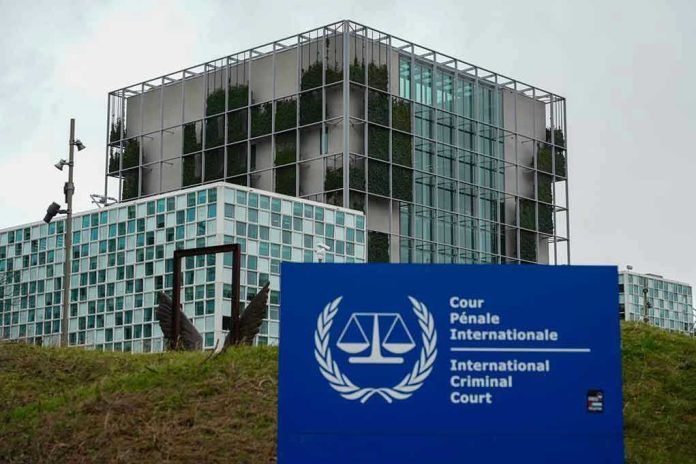
The International Criminal Court’s top prosecutor has been ordered to step aside from the high-profile Venezuela investigation after judges found a conflict of interest, raising urgent questions about impartiality in global justice.
Key Points
- ICC Appeals Chamber ruled Chief Prosecutor Karim Khan must recuse himself from the Venezuela case due to conflict of interest.
- The complaint was filed by the Arcadia Foundation, citing Khan’s familial tie to Maduro’s defense lawyer.
- The court emphasized that even the appearance of bias can erode trust in international justice.
- This rare directive sets a precedent for stricter conflict-of-interest enforcement at the ICC.
ICC Orders Chief Prosecutor to Step Aside Amid Conflict of Interest Allegations
The International Criminal Court’s Appeals Chamber has directed Chief Prosecutor Karim Khan to recuse himself from the ongoing investigation into alleged crimes against humanity committed by Nicolás Maduro’s government in Venezuela. The decision, issued August 1, 2025, follows a formal complaint from the Arcadia Foundation, a Washington-based human rights organization, which highlighted Khan’s familial relationship with Venkateswari Alagendra—his sister-in-law and a lawyer representing Maduro. The court determined this relationship jeopardizes the presumption of impartiality required of ICC officials and gave Khan three weeks to comply with the recusal directive.
Appeals judges order ICC prosecutor to recuse himself from Venezuela investigation https://t.co/U8Xk73Sg9f
— CTV News (@CTVNews) August 1, 2025
The ICC’s action comes after months of scrutiny. Public reports in September 2024 revealed Alagendra’s role on Maduro’s legal team, prompting the Arcadia Foundation to file its complaint in November 2024. The Foundation argued that Khan’s connection created not only a potential, but a perceived, conflict of interest under the Rome Statute, the ICC’s founding treaty. The five-judge appeals panel agreed, stressing that the appearance of bias is as damaging as actual bias, especially when global confidence in international tribunals is at stake.
Arcadia Foundation’s Complaint and Civil Society’s Role
The Arcadia Foundation’s involvement underscores the influential role of civil society in driving accountability at the highest levels of international law. Co-founder Robert Carmona-Borja stated, “The mere appearance of bias is enough to undermine the confidence of the public, victims and the international community in the ICC.” The Foundation’s complaint was grounded in explicit provisions of the Rome Statute, which mandates strict impartiality for court officials. Legal analysts note that while recusal requests at the ICC are not unprecedented, it is extremely rare for such action to be based on direct family relationships between senior court officials and defense counsel in an active investigation.
The ICC investigation into Venezuela focuses on allegations of political repression, torture, and extrajudicial killings dating back to 2017. The Maduro government, facing mounting international pressure, has consistently sought to delegitimize the court’s inquiry. By leveraging Alagendra’s expertise and her personal connection to Khan, Maduro’s defense strategy has drawn controversy and further complicated an already politicized case.
Broader Implications for International Justice and U.S. Interests
The decision to require Khan’s recusal has immediate and far-reaching consequences. In the short term, the Venezuela investigation faces disruption and possible delays as the ICC appoints new prosecutorial leadership. In the long run, the case sets a benchmark for enforcing conflict-of-interest rules at international tribunals, potentially prompting reforms in other global organizations. Legal experts emphasize that upholding both the reality and the perception of impartiality is essential for the legitimacy of the ICC and similar bodies.
The outcome carries particular weight for American interests and values. The United States, which has long championed the rule of law and due process, has often criticized the ICC for perceived political bias and selective justice. Recent years have seen growing skepticism about the court’s effectiveness and impartiality, especially among conservatives frustrated by what they view as international overreach and double standards. The recusal order may be seen as a necessary corrective—one that aligns with the American principle that even the appearance of impropriety must be swiftly addressed to preserve public trust.
Expert Opinions and the Path Forward
Legal scholars agree that the ICC’s handling of the Venezuela case will serve as a litmus test for its commitment to transparency and independence. Some critics argue that the court’s record has been inconsistent, with selective enforcement fueling claims of politicization. Others see the recusal order as a positive step, restoring confidence in the institution’s ability to police itself and uphold the highest ethical standards. The Rome Statute’s impartiality provisions, widely regarded as the backbone of the ICC’s legitimacy, have rarely faced such a public test.
As of early August 2025, Khan has three weeks to step aside from the Venezuela investigation or face possible formal disqualification. The ICC Appeals Chamber retains authority to pursue further legal action if he does not comply. For Venezuelan victims and civil society groups seeking justice, the recusal decision represents both a setback and a reaffirmation of the principle that no one is above the rules—not even the court’s own top prosecutor. For authoritarian regimes, the controversy may serve as ammunition to challenge the legitimacy of international investigations. For the broader international legal community, this case will resonate as a precedent for years to come.
Sources:
Legal Tools: Arcadia Foundation Complaint (PDF)
Thinc Israel: The International Criminal Court’s Imbalanced Justice
VOZ: ICC prosecutor Karim Khan’s sister-in-law represents Maduro in court



